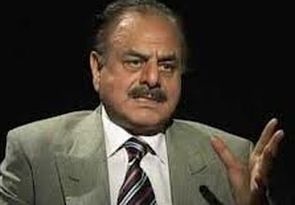
Arrested LeT ‘bomb expert’ Abdul Karim Tunda has revealed that he was in touch with former ISI chief Hamid Gul. Vicky Nanjappa explains why the retired Pakistani general is such a big threat.
Pakistan's former boss of Inter Services Intelligence Hamid Gul was brought under the radar on Monday by the Delhi police after arrested Lashkar-e-Tayiba ‘bomb expert’ Abdul Karim Tunda revealed that he was in touch with him.
While Gul may deny it outright, sources in the Research and Analysis Wing and the Intelligence Bureau say that the ex-ISI chief is a dangerous loose cannon.
Considered to be the architect of the Kashmir separatist movement, Gul has the makings of a very dangerous man since he has developed a network on a personal level even after he retired from the ISI more than a decade back.
Gul is revered and respected by the extremists and the kind of visitors he has when he checks in to a militant-dominated area speaks volumes of how deeply involved he is, an Indian intelligence officer says. “He along with former foreign service officers in Pakistan hold regular darbars and they get over a 100 visitors per day, and each of them is part of some terrorist network,” the officer adds.
The story of Hamid Gul dates back to the year he was appointed to the ISI. Considered a staunch ideologist who developed very strong links with terrorist groups while he was in service, what makes Hamid Gul extremely lethal is that apart from supporting terrorism as policy, he has a personal commitment to and belief about these ideologies.
He started off working alongside terror groups while he was in service as it was part of the official agenda. However, later he did everything to ensure that he remained in touch with the extremist elements and this was because he had a strong commitment towards the cause.
“In the bargain Gul established a personal network and till today he is one of the most respected persons in terror circles in Pakistan,’ the officer notes.
According to former R&AW chief C D Sahay, it is these personal networks which are unfortunately stronger and lasting.
“When one deals with his contacts in terror groups in Pakistan in a mercenary manner it is one thing. But when it becomes personal, it lasts forever,” Sahay says.
Another officer with the Intelligence Bureau told Rediff.com that a personal rapport even after retirement is what made Gul dangerous.
“After retirement he does things for a personal reason and while doing so he has no responsibility towards anyone. Although the ISI knows for a fact that he is going about his business, they look the other way. In fact the ISI would want more retired officials to deal with terror networks since they could absolve themselves of any blame,” the officer says.
“Even if a foreign agency were to find out that Gul was training or motivating terrorists, the ISI could always wriggle out by saying that they have no control over their former staff. The deploying of former ISI personnel to further their agenda only gives the agency a chance to deny their direct involvement,” the officer notes.
“The ISI in fact would encourage such persons and keep them intentionally off the radar. It is like the case of a terrorist who is more lethal when he is ideologically charged instead of being financially motivated,” the IB official also pointed out.
Sahay says the ISI has its own agenda and has not once deviated from it.
“They will continue to pursue their cause no matter what. Let me tell you, when Pakistan President Pervez Musharraf offered to talk peace with India, he did manage to convince the ISI to fall in line. He was able to do this only because he was the army chief as well. When he spoke peace with India, the ISI did fall in line and scale down its operations. However, one must always remember that not once did they wind up their capabilities for good. Once Musharaf lost power, they were back at it again,’ Sahay adds.
Image: Hamid Gul









 © 2025
© 2025